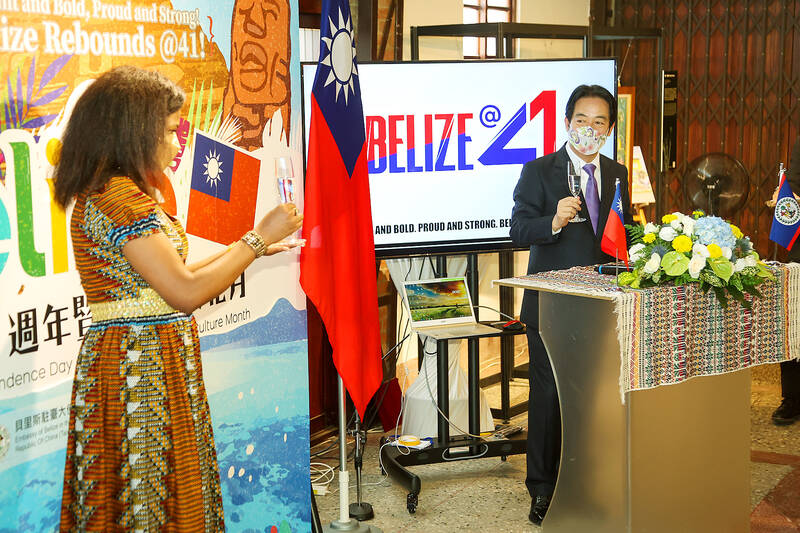Belize stands in solidarity with Ukraine and Taiwan, as both nations have encountered “aggression” from their neighbors, Belizean Prime Minister John Briceno said in a pre-recorded video yesterday.
“We stand in solidarity with Ukraine, as we do with Taiwan, which itself faces increased aggression from China,” Briceno said in the video, which was played at a ceremony in Taipei to mark the 41st anniversary of Belize’s independence.
The Central American nation achieved independence from the UK on Sept. 21, 1981.

Photo: CNA
“Dictatorial aggression” against Ukraine has not only resulted in the deaths of tens of thousands, but has also affected countries around the world, including Belize, Briceno said.
The Central American country supports Taiwan and Ukraine, because “we truly believe in the right to self-determination,” he added.
Belizean Ambassador to Taiwan Candice Augusta Pitts echoed the prime minister’s view, reaffirming at the event Belize’s “championing of Taiwan’s right to nationhood and self-determination.”
“Belize continues to advocate for Taiwan’s meaningful participation in the United Nations system,” the ambassador said while underlining the friendship and mutual support between the two nations in their 33 years of formal diplomatic relations.
Vice President William Lai (賴清德) thanked the Belizean government for its support for Taiwan when Taipei faces “growing threats” from Beijing, alluding to the increased military and economic pressure by China since a visit by US House of Representatives Speaker Nancy Pelosi early last month.
Despite facing these threats, the government would remain calm and rational, Lai said at the event, adding that it would never compromise the nation’s national sovereignty or democratic system.
Taiwan and Belize have enjoyed cordial relations over the past three decades through collaborations in such areas as public health, agriculture, education, information technology and environmental protection, Lai said.
In recent years, bilateral ties have further deepened, as Belize continues to support Taiwan’s inclusion in the World Health Assembly and other UN agencies, and Taiwan rolled out training programs for Belizean women, youth and small business owners, he said.
At the same time, trade and cultural exchanges have also expanded, Lai said, adding that bilateral trade saw a significant increase last year compared with 2020.
According to Customs Administration data, bilateral trade last year reached US$11.9 million, representing a year-on-year increase of 76 percent.
As part of the celebrations of Belize’s independence day, the Belizean embassy in Taiwan and the Central America Trade Office (CATO) on Tuesday last week launched Belize Culture Month at Bopiliao Historic Block in Taipei, featuring paintings, photographs and handicrafts created by Belizean artists, CATO said.
The event, which is to run until Sept. 25, also includes talks over the weekend, when experts will be invited to discuss Belize’s history, culture and cuisine, allowing local visitors to get a better understanding of Taiwan’s Central American ally, CATO said.

CALL FOR SUPPORT: President William Lai called on lawmakers across party lines to ensure the livelihood of Taiwanese and that national security is protected President William Lai (賴清德) yesterday called for bipartisan support for Taiwan’s investment in self-defense capabilities at the christening and launch of two coast guard vessels at CSBC Corp, Taiwan’s (台灣國際造船) shipyard in Kaohsiung. The Taipei (台北) is the fourth and final ship of the Chiayi-class offshore patrol vessels, and the Siraya (西拉雅) is the Coast Guard Administration’s (CGA) first-ever ocean patrol vessel, the government said. The Taipei is the fourth and final ship of the Chiayi-class offshore patrol vessels with a displacement of about 4,000 tonnes, Lai said. This ship class was ordered as a result of former president Tsai Ing-wen’s (蔡英文) 2018

‘SECRETS’: While saying China would not attack during his presidency, Donald Trump declined to say how Washington would respond if Beijing were to take military action US President Donald Trump said that China would not take military action against Taiwan while he is president, as the Chinese leaders “know the consequences.” Trump made the statement during an interview on CBS’ 60 Minutes program that aired on Sunday, a few days after his meeting with Chinese President Xi Jinping (習近平) in South Korea. “He [Xi] has openly said, and his people have openly said at meetings, ‘we would never do anything while President Trump is president,’ because they know the consequences,” Trump said in the interview. However, he repeatedly declined to say exactly how Washington would respond in

WARFARE: All sectors of society should recognize, unite, and collectively resist and condemn Beijing’s cross-border suppression, MAC Minister Chiu Chui-cheng said The number of Taiwanese detained because of legal affairs by Chinese authorities has tripled this year, as Beijing intensified its intimidation and division of Taiwanese by combining lawfare and cognitive warfare, the Mainland Affairs Council (MAC) said yesterday. MAC Minister Chiu Chui-cheng (邱垂正) made the statement in response to questions by Democratic Progressive Party (DPP) Legislator Puma Shen (沈柏洋) about the government’s response to counter Chinese public opinion warfare, lawfare and psychological warfare. Shen said he is also being investigated by China for promoting “Taiwanese independence.” He was referring to a report published on Tuesday last week by China’s state-run Xinhua news agency,

‘ADDITIONAL CONDITION’: Taiwan will work with like-minded countries to protect its right to participate in next year’s meeting, the foreign ministry said The US will “continue to press China for security arrangements and protocols that safeguard all participants when attending APEC meetings in China,” a US Department of State spokesperson said yesterday, after Beijing suggested that members must adhere to its “one China principle” to participate. “The United States insists on the full and equal participation of all APEC member economies — including Taiwan — consistent with APEC’s guidelines, rules and established practice, as affirmed by China in its offer to host in 2026,” the unnamed spokesperson said in response to media queries about China putting a “one China” principle condition on Taiwan’s